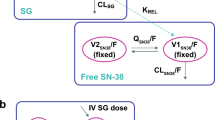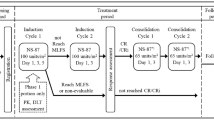Abstract
Goal
To evaluate epoetin alfa (EPO) treatment of anemia in geriatric cancer patients receiving chemotherapy, a retrospective subgroup analysis was conducted of anemic cancer patients ≥65 years of age from three 16-week community-based studies of thrice-weekly (TIW) or once-weekly (QW) EPO for chemotherapy-related anemia (CRA).
Patients and methods
Analyses were conducted on the overall geriatric population (≥65 years) and by age subgroup (65–74, 75–84, and ≥85 years), and compared with younger patients (<65 years) for each individual study and for pooled data.
Main results
Some 3,634 geriatric patients were compared with 3,467 younger patients. From baseline to final measurement, EPO therapy significantly increased Hb by 2.0 g/dl in patients ≥65 years and 1.9 g/dl in patients <65 years (P<0.0001) and reduced transfusion utilization in both groups (P<0.006). Both age groups also had significant improvements in quality of life (QOL), measured by the 100-mm Linear Analog Assessment Scale (LASA). In younger patients, mean LASA changes were significantly greater than those in geriatric patients (P<0.05); however, QOL improvements in both age groups were clinically meaningful. There were no significant differences across geriatric age subgroups or between TIW and QW regimens for Hb change or QOL improvement. Overall hematopoietic response rate to EPO was 65.4% for patients ≥65 years and 64.7% for patients <65 years. Predictors of greater hematopoietic response (based on a pooled analysis) included lower body weight, baseline Hb, and baseline serum erythropoietin levels; better tumor response; and history of EPO dose reduction and longer time on study.
Conclusions
Anemic geriatric patients receiving EPO for CRA responded comparably to younger patients <65 years and should be treated similarly.


Similar content being viewed by others
References
Aapro MS, Cella D, Zagari M (2002) Age, anemia, and fatigue. Semin Oncol 29(Suppl 8):55–59
Baraldi-Junkins CA, Beck AC, Rothstein G (2000) Hematopoeisis and cytokines: relevance to cancer and aging. Hematol Oncol Clin North Am 14:45–61
Begg CB, Carbone PP (1983) Clinical trials and drug toxicity in the elderly: the experience of the Eastern Cooperative Oncology Group. Cancer 52:1986–1992
Beguin Y (1998) Prediction of response to optimize outcome of treatment with erythropoietin. Semin Oncol 25(Suppl 7):27–34
Cascinu S, Del Ferro E, Fedeli A, Ligi M, Alessandroni P, Catalano G (1995) Recombinant human erythropoietin treatment in geriatric cancer patients with cisplatin-associated anemia. Oncology 52:422–426
Cella D (1997) The Functional Assessment of Cancer Therapy-Anemia (FACT-An) scale: a new tool for the assessment of outcomes in cancer anemia and fatigue. Semin Hematol 34(Suppl 2):13–19
Cella D (1998) Factors influencing quality of life in cancer patients: anemia and fatigue. Semin Oncol 25(Suppl 7):43–46
Christman K, Muss HB, Case LD, Stanley V (1992) Chemotherapy of metastatic breast cancer in the elderly: the Piedmont Oncology Association experience. JAMA 268:57–62
Curt GA, Breitbart W, Cella D et al (2000) Impact of cancer-related fatigue on the lives of patients: new findings from the Fatigue Coalition. Oncologist 5:353–360
Demetri GD, Kris M, Wade J, Degos L, Cella D, for the Procrit Study Group (1998) Quality-of-life benefit in chemotherapy patients treated with epoetin alfa is independent of disease response or tumor type: results from a prospective community oncology study. J Clin Oncol 16:3412–3425
Gabrilove JL, Cleeland CS, Livingston RB, Sarokhan B, Winer E, Einhorn LH (2001) Clinical evaluation of once-weekly dosing of epoetin alfa in chemotherapy patients: improvements in hemoglobin and quality of life are similar to three-times-weekly dosing. J Clin Oncol 19:2875–2882
Gelman RS, Taylor SG IV (1984) Cyclophosphamide, methotrexate, and 5-fluorouracil chemotherapy in women more than 65 years old with advanced breast cancer: the elimination of age trends in toxicity by using doses based on creatinine clearance. J Clin Oncol 2:1404–1413
Giovanazzi-Bannon S, Rademaker A, Lai G, Benson AB 3rd (1994) Treatment tolerance of elderly cancer patients entered onto phase II clinical trials: an Illinois Cancer Center study. J Clin Oncol 12:2447–2452
Glaspy J, Bukowski R, Steinberg D, Taylor C, Tchekmedyian S, Vadhan-Raj S, for the Procrit Study Group (1997) Impact of therapy with epoetin alfa on clinical outcomes in patients with nonmyeloid malignancies during cancer chemotherapy in community oncology practice. J Clin Oncol 15:1218–1234
Gough IR, Furnival CM, Schilder L, Grove W (1983) Assessment of the quality of life of patients with advanced cancer. Eur J Cancer Clin Oncol 19:1161–1165
Hutchins LF, Unger JM, Crowley JJ, Coltman CA Jr, Albain KS (1999) Underrepresentation of patients 65 years of age or older in cancer-treatment trials. N Engl J Med 341:2061–2067
Kennedy BJ (2000) Aging and cancer. Oncology 14:1731–1733
Lichtman SM, Skirvin JA (2000) Pharmacology of antineoplastic agents in older cancer patients. Oncology 14:1743–1755
Littlewood TJ, Bajetta E, Nortier JWR, Vercammen E, Rapoport B, for the Epoetin Alfa Study Group (2001) Effects of epoetin alfa on hematologic parameters and quality of life in cancer patients receiving nonplatinum chemotherapy: results of a randomized, double-blind, placebo-controlled trial. J Clin Oncol 19:2865–2874
McCormack HM, de L Horne DJ, Sheather S (1988) Clinical applications of visual analog scales: a critical review. Psychol Med 18:1007–1019
Naeim A, Reuben D (2001) Geriatric syndromes and assessment in older cancer patients. Oncology 15:1567–1580
National Comprehensive Cancer Network (2006) Cancer- and treatment-related anemia: clinical practice guidelines in oncology, Version 2.2006
Patrick DL, Gagnon DD, Zagari MJ, Mathijs R, Sweetenham J, for the Epoetin Alfa Study Group (2003) Assessing the clinical significance of health-related quality of life (HrQOL) improvements in anaemic cancer patients receiving epoetin alfa. Eur J Cancer 39:335–345
PROCRIT (epoetin alfa) (prescribing information) (2005) Ortho Biotech Products, L.P., Raritan, New Jersey
Quirt I, Robeson C, Lau CY et al, and the Canadian Eprex Oncology Study Group (2001) Epoetin alfa therapy increases hemoglobin levels and improves quality of life in patients with cancer-related anemia who are not receiving chemotherapy and patients with anemia who are receiving chemotherapy. J Clin Oncol 19:4126–4134
Shasha D, George M (2002) Rapid hemoglobin response in anemic cancer patients undergoing chemotherapy or chemoradiation therapy receiving once-weekly epoetin alfa treatment (abstract). Blood 11(pt 2):17b
Shasha D, George MJ, Harrison LB (2003) Once-weekly dosing of epoetin alfa increases hemoglobin and improves quality of life in anemic cancer patients receiving radiation therapy either concomitantly or sequentially with chemotherapy [abstract]. Cancer 98:1072–1079
Witzig TE, Silberstein PT, Loprinzi CL et al (2005) Phase III, randomized, double-blind study of epoetin alfa versus placebo in anemic patients with cancer undergoing chemotherapy. J Clin Oncol 23:2606–2617
Wu AW, Revicki DA, Jacobson D, Malitz FE (1997) Evidence for reliability, validity and usefulness of the Medical Outcomes Study HIV Health Survey (MOS-HIV). Qual Life Res 6:481–493
Yancik R, Ganz PA, Varricchio CG, Conley B (2001) Perspectives on comorbidity and cancer in older patients: approaches to expand the knowledge base. J Clin Oncol 19:1147–1151
Acknowledgements
The authors wish to thank George D. Demetri, M.D., of the Dana-Farber Cancer Institute, Boston, MA, for his assistance in the initial concept development for this analysis, and Yvonne Yarker, Ph.D., of Thomson Scientific Connexions, Newtown, PA, for editorial assistance in preparing this manuscript. This research was supported by Ortho Biotech Clinical Affairs, LLC. Protocol numbers for the studies analyzed are PR93-27-003, PR95-27-014, and PR97-27-042.
Author information
Authors and Affiliations
Corresponding author
Rights and permissions
About this article
Cite this article
Aapro, M.S., Dale, D.C., Blasi, M. et al. Epoetin alfa increases hemoglobin levels and improves quality of life in anemic geriatric cancer patients receiving chemotherapy. Support Care Cancer 14, 1184–1194 (2006). https://doi.org/10.1007/s00520-006-0076-z
Received:
Accepted:
Published:
Issue Date:
DOI: https://doi.org/10.1007/s00520-006-0076-z




